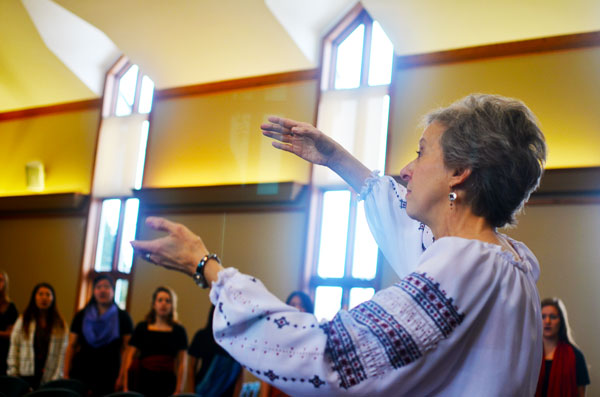“Everyone circle around the room,” instructed Debra Detwiler Brubaker to her Women’s World Music Choir, not impressed with their tired, mid-semester sound.
The choir members pushed their chairs into the center of the spacious room. “Get into a low squat. Lower! Good.”“Now, we’re going to sing from our ovaries.”
The choir sunk down into a low squat, with their hands almost touching the ground. Uncomfortable giggles circled the room, but Detwiler Brubaker stayed serious.
“Now, sing,” she said, “You have the power to create. You are the beginning of the next generation. Open up and sing with this power you carry.”
Her laugh echoes around the room when asked how she began her musical journey. She speaks quietly yet firmly, in a voice used to commanding rooms of rowdy students; her voice weaves in and out of the conversation, the timbre moving with a melody.
As a first-year at Goshen College, Detwiler Brubaker was certain she did not want to major in music.
“I knew I wanted to participate in music,” she said. “I didn’t think I wanted to major in music.”
Detwiler Brubaker eventually “caved into” a music education major.
She then turned to graduate school. After getting her master’s degree in choral conducting and vocal performance, Detwiler Brubaker taught at Bluffton University for 10 years. She once again returned to school, earning her doctorate in voice and choral conducting.
In 1999, she joined the faculty at Goshen College and has been here for 17 years.
“When I came to Goshen College,” said Detwiler Brubaker, “we had a Chamber Choir and Chorale; I directed Chorale. After a while, I inherited Chamber Choir. We had another director come, Jim Heiks, who said, ‘You can’t have a choir program without a Men’s Choir.’ And I said, you can’t have a Men’s Choir without a Women’s Choir.”
At first, Detwiler Brubaker hated the music she found for Women’s Choirs and felt no connection to it.
“I thought, I have a Women’s Choir now: what am I going to do with it?” said Detwiler Brubaker. “I love international music, so I thought this is what I’ll do. I’ll start a Women’s World Music Choir.”
Women’s World Music Choir focuses on connections through song; each song they perform forms a link to women around the world.
The choir members sing barefoot, keeping them grounded to the earthly bond that unifies all women. Each song is sung to honor and revel in womanly power.
“When one is working with a single gender choir,” said Detwiler Brubaker, “the room just feels different. There are unspoken assumptions and ways of being that automatically go into effect – people relate more clearly, it feels like more of a safe space.”
“Denko” is one of Detwiler Brubaker’s favorite songs to perform with Women’s Choir.
She describes “Denko” as a “song that presented itself to us.”
“I have had this experience several times, where, it’s kind of a vacuum: we need a song, haven’t found one, and all the sudden, a song appears at the right time,” said Detwiler Brubaker.
“Denko” presented itself to her in 2007, right before Goshen’s Christmas concert, Festival of Carols.
“Denko” illustrates the story of a woman who prays for a baby and receives this desire.
The woman’s entire community takes responsibility for this child, saying that they need to work even harder to make sure that the baby is raised well.
Detwiler Brubaker looks at her life through a songline, what she describes as “your life in music.”
“It refers to how music has been a thread or a line through your life,” Detwiler Brubaker explains, her face lighting up as she describes the concept.
Detwiler Brubaker looks at hers as a web, reaching out to people all around her. Through Women’s World Music Choir, Detwiler Brubaker’s songline is connected to women of all cultures.
“I’ve encountered the idea of the web – as in a spider’s web – when I work with women’s choirs,” Detwiler Brubaker explains. “When one part of the web vibrates, the whole web vibrates and we become more aware of each other. When someone has a question, they feel free to raise it, and not sit quietly, worried that they might be seen as ‘dumb.’”
“People begin to realize that their notes, rhythms and movements affect someone else across the choir, and they rise to the occasion, singing more into their best self,” she said. “When women feel safe and cared for, their natural divinity blossoms forth.”
“We are not taught that we are divine beings,” said Detwiler Brubaker. “But before there was Christian patriarchy, there was earth-based matriarchy. In most indigenous cultures, the matriarchy was subsumed by the patriarchy when the earth-based legends were turned into Christian celebrations. Dig deeply enough, and you will find this truth.”



